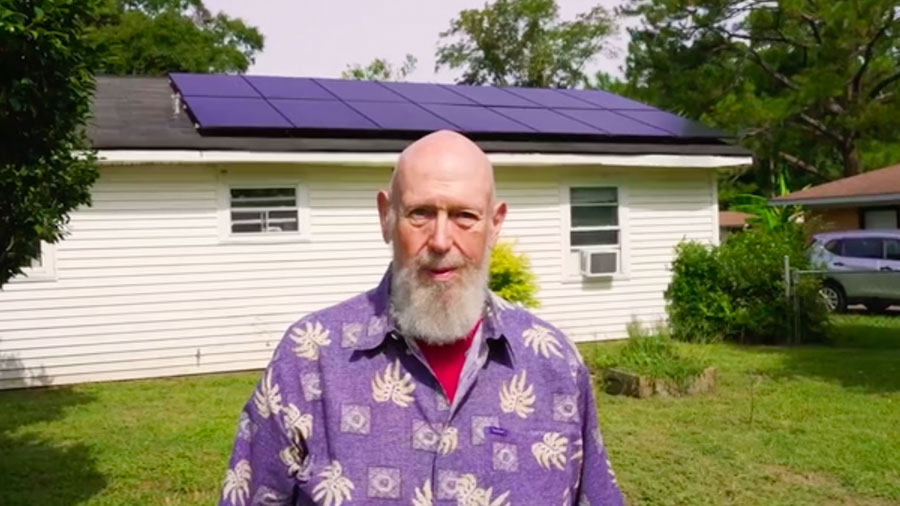A Solar Leasing Program Offers a Bright Future for Renewable Energy
Rhea-AI Summary
Capital Good Fund's Georgia BRIGHT program is offering solar panel and battery storage leases to lower-income Georgia residents and nonprofits, helping them save on electric bills through the Inflation Reduction Act's 'direct pay' feature. The program aims to benefit over 16,000 households by 2029. Supported by a $250,000 Wells Fargo Foundation grant and a $156 million Solar for All grant, the initiative allows Georgia households earning under $150,000 annually to lease solar panels with minimal upfront costs. Participants average $272 in first-year savings, projected to increase to $655 in the final year of the 25-year lease. The program addresses Georgia's high low-income energy burden, where households spend about 19.4% of income on electricity.
Positive
- Program expected to increase Georgia's residential solar adoption by 50%
- First-year average savings of $272, increasing to $655 by year 25
- Secured $156 million Solar for All grant for expansion
- 90% utility bill reduction reported by early participants
Negative
- to Georgia residents earning under $150,000 annually
- Requires 25-year lease commitment
- Program restricted to homes with suitable roof conditions
News Market Reaction 1 Alert
On the day this news was published, WFC declined 1.52%, reflecting a mild negative market reaction.
Data tracked by StockTitan Argus on the day of publication.
With help from philanthropic partners like Wells Fargo, Capital Good Fund's solar leasing program helps lower-income residents and nonprofit organizations save on their utility bills.
NORTHAMPTON, MA / ACCESSWIRE / November 4, 2024 / Wells Fargo
Key takeaways
Capital Good Fund's Georgia BRIGHT program offers solar panel and battery storage leases to help lower-income Georgia residents save on electric bills by utilizing the "direct pay" feature of the Inflation Reduction Act. It's piloting a Pennsylvania BRIGHT program, too.
By the end of 2029, Georgia BRIGHT plans to bring benefits of solar energy to more than 16,000 households.
Participants generate renewable power where they live or work, giving them access to cleaner, lower-cost electricity.
Optional battery storage can enhance energy savings and the resiliency of the state's electrical grid.
Watch: Capital Good Fund's Georgia Bright program is reducing the utility bills of homeowners and organizations, including Marc Thomas of Savannah, Georgia, and Trinity Episcopal Church in Statesboro, Georgia. (2:02)
Marc Thomas used to worry about the frequent, nearly week-long power outages - four since he moved to his coastal Georgia home - that threatened his health.
"I need my CPAP to sleep safely at night, otherwise I could easily have a heart attack," he said.
These days, he rests easier, confident that his CPAP machine, a device that helps people with sleep apnea breathe during sleep, will always have power. In December 2023, Thomas and his wife Margo got a solar energy array installed on their Savannah, Georgia, home. If an outage occurs, a battery draws stored electricity, ensuring they are never left in the dark.
The couple is among many Georgia homeowners and organizations that have leased solar panels through Capital Good Fund's Georgia BRIGHT program. The initiative allows Georgia households making less than
In addition to providing crucial backup electricity in case of a power outage, the solar panels are helping participants save on their electricity bills. In the first year, the average annual savings for homeowners in the program is
Wells Fargo is a philanthropic partner supporting Capital Good Fund as part of the bank's sustainability philanthropy. The shared goal is to expand access and financial opportunities that enable broader clean energy adoption with improved affordability and accessibility.
Georgia has among the highest low-income energy burdens in the country. Low- and moderate-income households in the state spend on average
The Georgia BRIGHT program helps participants produce their own power, so they buy much less electricity. The savings can lower their utility bill enough to offset the cost of the lease, allowing for immediate savings.
For the Thomases, their utility bill went down
"We'd been interested in looking at solar power for some time, but had found that the installation costs were expensive," he said. "We've been very pleased with the result."
Expanding access to renewables
From power outages to rate hikes, there are many reasons why solar energy and batteries could help Georgia residents. Frequent extreme weather, from hurricanes to heatwaves, is hitting Georgia's electrical grid disproportionately hard, Climate Central reports, and rising temperatures (PDF) will only add strain to the system.
Yet it's among the states with the lowest residential solar energy adoption, according to Andy Posner, founder and CEO of Capital Good Fund, a nonprofit community development financial institution (CDFI).
Georgia BRIGHT uses a new funding method for expanding renewable energy. As part of the Inflation Reduction Act's tax incentives, nonprofits like Capital Good Fund can use "direct pay" to spread the benefits of rooftop solar tax credits to lower-income Americans, who don't have the tax burden to be able to use traditional tax credits. Capital Good Fund accesses the "direct pay" incentive on behalf of these homeowners and incorporates the savings into the lease which allows for greater affordability for the homeowner.
The Wells Fargo Foundation awarded the CDFI a
"It's really the case with solar that if you create the right financial instrument and build the trust to reach these communities, that you can unlock the potential [to grow solar]," Posner said.
The solar panels, which are manufactured in Georgia, and battery storage systems help lower-income residents use cheap, renewable electricity when they need it, like on increasingly hot nights. When people are less vulnerable to extreme temperatures, they breathe better, feel less depressed, and avoid a laundry list of other health risks, data shows. But if they can't afford it, many people choose to not run their air conditioning.
Georgia BRIGHT participants may opt to add battery storage to keep their electricity running when the power is out or when panels aren't active, like at night or during rough storms. They can also increase participants' energy savings and reduce their carbon footprint by maximizing how much solar energy they use, according to Alicia Brown, who directs the program.
"We have hurricanes, tropical storms, and other weather events that can cause power outages," she said. "When you're a lower- or middle-income family, losing a refrigerator full of groceries can be a real financial burden."
Empowering community organizations with renewable energy investments
In addition to the residential program, Georgia BRIGHT offers a commercial program for nonprofits and community organizations, enabling them to take advantage of the savings and put their energy toward serving those in need.
Trinity Episcopal Church in Statesboro, Georgia, is the first mission-driven group to take advantage of the program. The solar array on the church roof could save the parish an estimated
"In Georgia, our electric rates have been going up significantly. We were at a moment when we needed to do something to mitigate the rising cost of energy," said Todd, the church's rector.
The church plans to reinvest the utility savings to meet the congregation's needs.
"The solar panel installation is really a part of our commitment to look at ways to use more … things that are better for the environment and better for the Earth, but also things that help our community," Todd said.
A rapid boost to Georgia's residential solar
About 70 arrays have been installed as part of the pilot, as of August 2024. But Posner said Georgia BRIGHT will soon change the state's renewable energy landscape.
The Wells Fargo Foundation grant, which allowed Capital Good Fund to increase it's capacity, supported the CDFI's pursuit of government funding. Capital Good Fund was awarded a
The money will also allow the CDFI to bring renewable energy to hundreds of extremely low-income or vulnerable households and thousands of others through community solar and utility-led projects in Georgia.
In total, that's a target of more than 16,000 households tapping solar energy by the end of 2029. Plus, Capital Good Fund has already started a Pennsylvania version of the pilot program.
"Not only are we reaching communities that, across the board, are less likely to go solar," Posner said, "we're doing it in one of the hardest markets for solar."
How you can apply to Georgia BRIGHT
Who's eligible?
The program is open to single-family homeowners in Georgia who make less than
What does it cost?
Participants pay 25-year lease payments, which are often covered by utility savings. The program covers maintenance costs. If a participant sells their house or moves, the next residents can continue the lease, or participants can buy out the lease with proceeds from the property sale.
How do I apply?
Visit georgiabright.org to get a free solar consultation.

The solar panels on Marc Thomas' roof help ensure his machine can continue running during power outages.
View additional multimedia and more ESG storytelling from Wells Fargo on 3blmedia.com.
Contact Info:
Spokesperson: Wells Fargo
Website: https://www.3blmedia.com/profiles/wells-fargo
Email: info@3blmedia.com
SOURCE: Wells Fargo
View the original press release on accesswire.com








